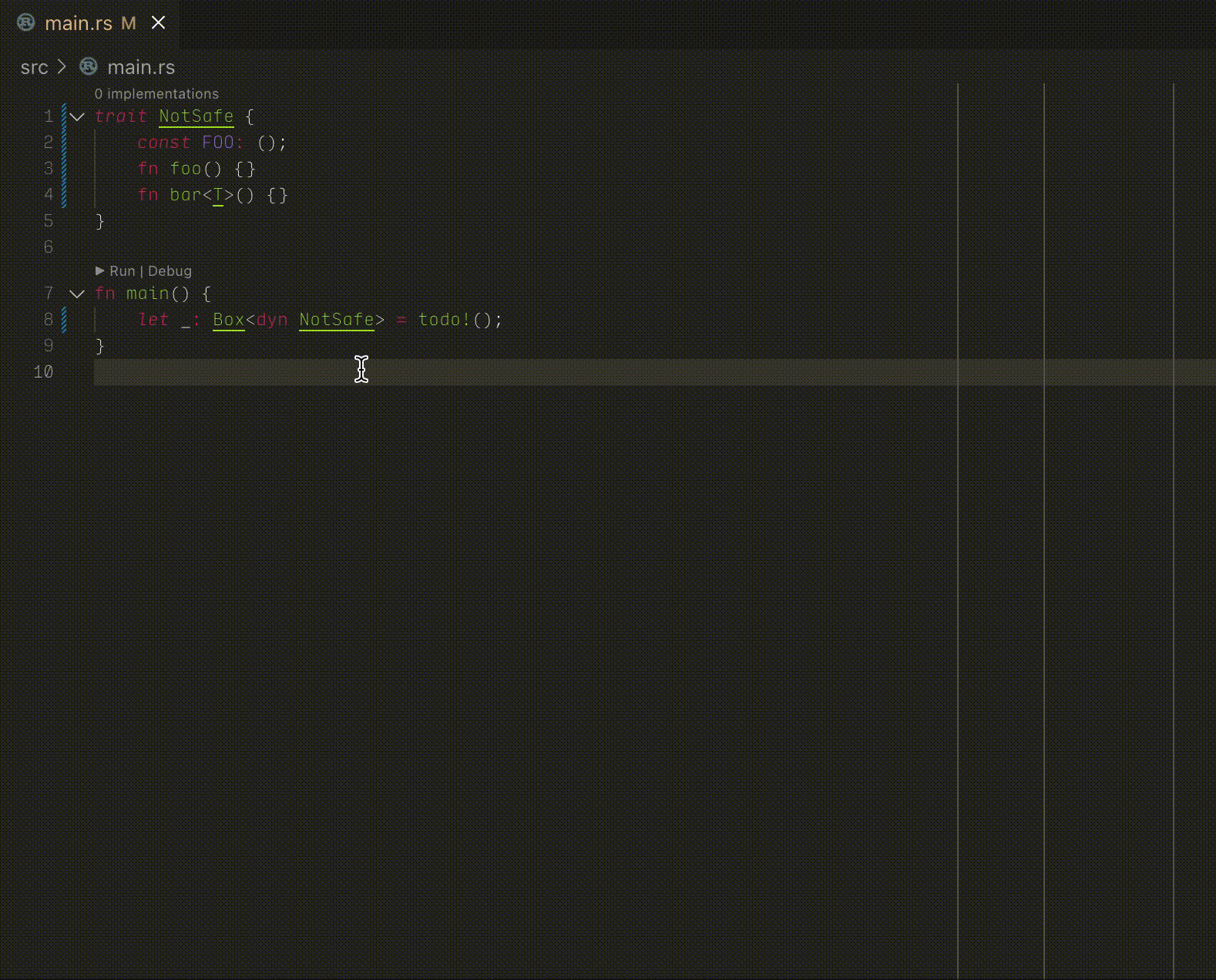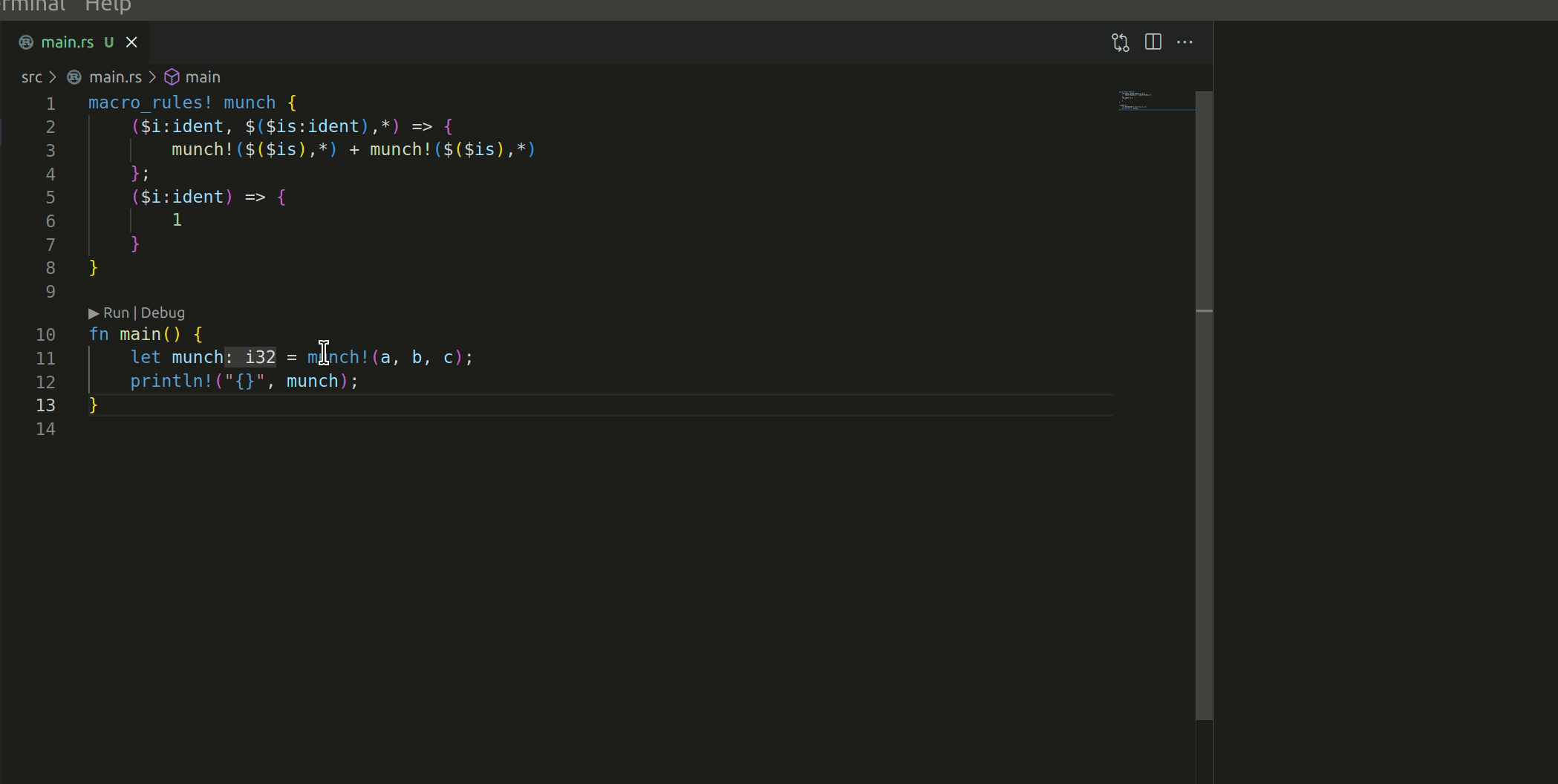minor: tweak wording and remove blank issue template
There's already a "blank issue" link at the bottom, and some users seem to pick this one because it's the first.
Revert "Use ZWNJ to prevent VSCode from forming ligatures between hints and code"
Doesn't actually seem to fix the bug, it seems to be theme dependent and I am not sure what causes it
Reverts rust-lang/rust-analyzer#13886
Colorize `cargo check` diagnostics in VSCode via text decorations
Fixes#13648

Use ANSI control characters to display text decorations matching the VScode terminal theme, and strip them out when providing text content for rustc diagnostics.
This adds the small [`anser`](https://www.npmjs.com/package/anser) library (MIT license, no dependencies) to parse the control codes, and it also supports HTML output so it should be fairly easy to switch to a rendered HTML/webview implementation in the future
I also updated the default `cargo check` command to use the rendered ANSI diagnostics, although I'm not sure if it makes sense to put this kind of thing behind a feature flag, or whether it might have any issues on Windows (as I believe ANSI codes are not used for colorization there)?
Use ANSI control characters to display text decorations matching the
VScode terminal theme, and strip them out when providing text content
for rustc diagnostics.
This adds the small `anser` library to parse the control codes, and it
also supports HTML output so it should be fairly easy to switch to a
rendered HTML/webview implementation if desired.
Rename `checkOnSave` settings to `check`
Now that flychecks can be triggered without saving the setting name doesn't make that much sense anymore. This PR renames it to just `check`, but keeps `checkOnSave` as the enabling setting.
Add action to expand a declarative macro once, inline. Fixes#13598
This commit adds a new r-a method, `expandMacroInline`, which expands the macro that's currently selected. See #13598 for the most applicable issue; though I suspect it'll resolve part of #5949 and make #11888 significantly easier).
The macro works like this:

I have 2 questions before this PR can be merged:
1. **Should we rustfmt the output?** The advantage of doing this is neater code. The disadvantages are we'd have to format the whole expr/stmt/block (since there's no point just formatting one part, especially over multiple lines), and maybe it moves the code around more in weird ways. My suggestion here is to start off by not doing any formatting; and if it appears useful we can decide to do formatting in a later release.
2. **Is it worth solving the `$crate` hygiene issue now?** -- I think this PR is usable as of right now for some use-cases; but it is annoying that many common macros (i.e. `println!()`, `format!()`) can't be expanded further unless the user guesses the correct `$crate` value. The trouble with solving that issue is that I think it's complicated and imperfect. If we do solve it; we'd also need to either change the existing `expandMacro`/`expandMacroInline` commands; provide some option to allow/disallow `$crate` expanding; or come to some other compromise.
fix: generate async delegate methods
Fixes a bug where the generated async method doesn't await the result before returning it.
This is an example of what the output looked like:
```rust
struct Age<T>(T);
impl<T> Age<T> {
pub(crate) async fn age<J, 'a>(&'a mut self, ty: T, arg: J) -> T {
self.0
}
}
struct Person<T> {
age: Age<T>,
}
impl<T> Person<T> {
pub(crate) async fn age<J, 'a>(&'a mut self, ty: T, arg: J) -> T {
self.age.age(ty, arg) // .await is missing
}
}
```
The `.await` is missing, so the return type is `impl Future<Output = T>` instead of `T`
feat: add the ability to limit the number of threads launched by `main_loop`
## Motivation
`main_loop` defaults to launch as many threads as cpus in one machine. When developing on multi-core remote servers on multiple projects, this will lead to thousands of idle threads being created. This is very annoying when one wants check whether his program under developing is running correctly via `htop`.
<img width="756" alt="image" src="https://user-images.githubusercontent.com/41831480/206656419-fa3f0dd2-e554-4f36-be1b-29d54739930c.png">
## Contribution
This patch introduce the configuration option `rust-analyzer.numThreads` to set the desired thread number used by the main thread pool.
This should have no effects on the performance as not all threads are actually used.
<img width="1325" alt="image" src="https://user-images.githubusercontent.com/41831480/206656834-fe625c4c-b993-4771-8a82-7427c297fd41.png">
## Demonstration
The following is a snippet of `lunarvim` configuration using my own build.
```lua
vim.list_extend(lvim.lsp.automatic_configuration.skipped_servers, { "rust_analyzer" })
require("lvim.lsp.manager").setup("rust_analyzer", {
cmd = { "env", "RA_LOG=debug", "RA_LOG_FILE=/tmp/ra-test.log",
"/home/jlhu/Projects/rust-analyzer/target/debug/rust-analyzer",
},
init_options = {
numThreads = 4,
},
settings = {
cachePriming = {
numThreads = 8,
},
},
})
```
## Limitations
The `numThreads` can only be modified via `initializationOptions` in early initialisation because everything has to wait until the thread pool starts including the dynamic settings modification support.
The `numThreads` also does not reflect the end results of how many threads is actually created, because I have not yet tracked down everything that spawns threads.